|
|
|
Sort Order |
|
|
|
Items / Page
|
|
|
|
|
|
|
| Srl | Item |
| 1 |
ID:
124720
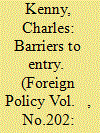

|
|
|
|
|
| Publication |
2013.
|
| Summary/Abstract |
American spent much of this summer arguing over migration reform, and south Africans spent much of it contemplating Nelson Mandela's legacy. But the link between the two went unnoticed one of Mandela's biggest legacies was to show that immigration reform on a scale hugely more ambitious than any thing proposed in the hall of the US Congress can benefit everyone, in real economic terms.
|
|
|
|
|
|
|
|
|
|
|
|
|
|
|
|
| 2 |
ID:
105012
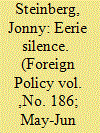

|
|
|
| 3 |
ID:
117507
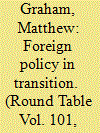

|
|
|
|
|
| Publication |
2012.
|
| Summary/Abstract |
At the beginning of the transition from apartheid to democracy, the African National Congress (ANC) was unprepared for foreign policy discussion, a lack of readiness magnified by the collapse of international Communism and the Cold War ideology. President De Klerk and the National Party controlled foreign policy in the early years of the transition and began the process of reintegration with the international community, The ANC initially struggled to adapt to the new international situation, whereas De Klerk was successful in wooing the international community. In the later stages of transition, the ANC developed a greater sense of direction and substance in foreign relations, although there were differences of opinion among and between the leadership and the rank and file. Already in 1994 there was evidence of tension between idealism and pragmatism. Post-apartheid foreign policy under Mandela was riddled with inconsistencies, which stemmed from the events of South Africa's transition
|
|
|
|
|
|
|
|
|
|
|
|
|
|
|
|
| 4 |
ID:
135036
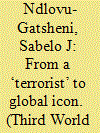

|
|
|
|
|
| Summary/Abstract |
This article examines Nelson Rolihlahla Mandela’s political life and legacy from the perspective of critical decolonial liberation ethics, which privileges a paradigm of peace, humanism and racial harmony and opposes the imperial/colonial/apartheid paradigm of war, racial hatred and separation of races. This system emerged in the 15th century and was driven by the desire to conquer, dispossess, colonise, exploit and segregate people according to race and, alongside imperatives of primitive accumulation, it informed the colonisation of South Africa and the imposition of apartheid. Mandela was a liberation fighter who provided an antidote to the colonial ideology of racial profiling and hierarchisation. What distinguished him from other freedom fighters was his commitment to the cause of human rights as early as the 1960s, long before it attained its status as a constitutive part of global normative order. When Mandela became the first black president of a democratic South Africa, his practical and symbolic overtures to whites and his reconciliatory politics aimed to call them back to a new inclusive humanity. Critical decolonial ethics logically enables a tribute to Mandela that privileges his commitment to a post-racial society and new humanism.
|
|
|
|
|
|
|
|
|
|
|
|
|
|
|
|
| 5 |
ID:
143332
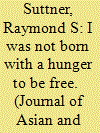

|
|
|
|
|
| Summary/Abstract |
There is a stark contrast between Nelson Mandela the freedom fighter and the young man who grew up in rural Transkei without a ‘hunger to be free’. Until entering Johannesburg in 1941, he generally did not recognise or resist white oppression. Mandela was destined to be counsellor to the future abaThembu king, not a leader himself. Nevertheless, he encountered discordant notes, suggesting that he could not be a man as long as Africans were a conquered people. His consequent transition to manhood remained unresolved until his involvement in the defiance of the apartheid regime, which signified the attainment of his manhood that had been denied to him in earlier life.
|
|
|
|
|
|
|
|
|
|
|
|
|
|
|
|
| 6 |
ID:
129824
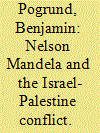

|
|
|
|
|
| Publication |
2014.
|
| Summary/Abstract |
Nelson Mandela's death set off a rush by many in the world to search for lessons in his life, and none have been more eager to do so than Israelis and Palestinians trapped in their conflict. The Importance of Balanced and Compassionate Leadership. The most obvious lesson he offers lies in the critical nature of leadership. After 27 years of imprisonment he emerged into a South Africa torn by violence as the black majority struggled for freedom against a ruling white minority. He quelled the anger among his own people and led them on the path of compromise and reconciliation. His courage and vision earned the respect and support of most whites, which allowed for the rise of a new united South Africa of democracy and non-racism.
|
|
|
|
|
|
|
|
|
|
|
|
|
|
|
|
| 7 |
ID:
103032
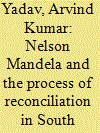

|
|
|
| 8 |
ID:
155705
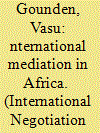

|
|
|
|
|
| Summary/Abstract |
Although informal and traditionally driven practices of mediation have existed for many generations, institutionalized and African-driven mediation became more important following the end of the Cold War. Mediation initiatives undertaken over the past 25 years, partly as a consequence of the increase in intra-state conflicts on the continent, have resulted in the generation of a deep body of knowledge and the evolution of a community of practitioners. This article examines two of the first post-1990 African-driven mediation processes – the Arusha Peace Process for Burundi and the Inter-Congolese Dialogue (ICD) for the Democratic Republic of the Congo (DRC) – to highlight key lessons that emerged, including the choice of mediator, who to include in the mediation, the impact of regional and international dynamics on the mediation, the importance and challenges of addressing the root causes of the conflict in a mediation process, and the role of non-state actors and Track II diplomacy.
|
|
|
|
|
|
|
|
|
|
|
|
|
|
|
|
| 9 |
ID:
129837
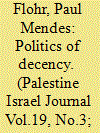

|
|
|
|
|
| Publication |
2014.
|
| Summary/Abstract |
It is said that Nelson Mandela's political vision was fundamentally "driven by a profound sense of decency." This may also be said of the Jewish philosopher Martin Buber (1878-1965). Alert to the indignities faced by his fellow human beings, he found it simply indecent to allow such injustices to continue. According, he taught that a sense of decency should inform our ethical and political judgment.
|
|
|
|
|
|
|
|
|
|
|
|
|
|
|
|
| 10 |
ID:
131495
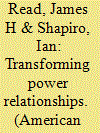

|
|
|
|
|
| Publication |
2014.
|
| Summary/Abstract |
Chronic communal conflicts often embody prisoner's dilemmas. Both communities prefer peace to war. Yet neither trusts the other, viewing the other's gain as its loss, so potentially shared interests often go unrealized. Achieving positive-sum outcomes from apparently zero-sum struggles requires a particular kind of risk-embracing leadership. To succeed leaders must (a) see power relations as potentially positive-sum, (b) strengthen negotiating adversaries when tempted to weaken them, and (c) demonstrate hope for a positive future and take great personal risks to achieve it. Such leadership is exemplified by Nelson Mandela and F. W. de Klerk in the South African democratic transition. To illuminate the strategic dilemmas Mandela and de Klerk faced, we examine the work of Robert Axelrod, Thomas Schelling, and Josep Colomer, who highlight important dimensions of the problem but underplay the role of risk-embracing leadership. Finally we discuss leadership successes and failures in the Northern Ireland settlement and the Israeli-Palestinian conflict.
|
|
|
|
|
|
|
|
|
|
|
|
|
|
|
|
| 11 |
ID:
095466
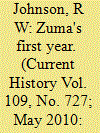

|
|
|
|
|
| Publication |
2010.
|
| Summary/Abstract |
So factionalized and divided is the ANC that it is not clear that either the party or the country is still governable.
|
|
|
|
|
|
|
|
|
|
|
|
|
|
|
|
|
|
|
|
|